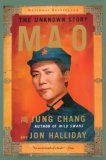Summary | Excerpt | Reviews | Beyond the Book | Readalikes | Genres & Themes | Author Bio

Critics' Opinion:
Readers' Opinion:
First Published:
Oct 2005, 832 pages
Paperback:
Nov 2006, 864 pages
 Book Reviewed by:
Book Reviewed by:
BookBrowse Review Team
Buy This Book
On the Cusp from Ancient to Modern
(1893–1911 - age 1–17)
Mao tse-tung, who for decades held absolute power over the lives of
one-quarter of the world's population, was responsible for well over
70 million deaths in peacetime, more than any other twentieth-century
leader. He was born into a peasant family in a valley called Shaoshan,
in the province of Hunan, in the heartland of China. The date was 26
December 1893. His ancestors had lived in the valley for five hundred
years.
This was a world of ancient beauty, a temperate, humid region whose
misty, undulating hills had been populated ever since the Neolithic age.
Buddhist temples dating from the Tang dynasty (ad 618–906), when
Buddhism first came here, were still in use. Forests where nearly 300
species of trees grew, including maples, camphor, metasequoia and the
rare ginkgo, covered the area and sheltered the tigers, leopards and
boar that still roamed the hills. (The last tiger was killed in 1957.)
These hills, with neither roads nor navigable rivers, detached the
village from the world at large. Even as late as the early twentieth
century an event as momentous as the death of the emperor in 1908 did
not percolate this far, and Mao found out only two years afterwards when
he left Shaoshan.
The valley of Shaoshan measures about 5 by 3.5 km. The 600-odd families
who lived there grew rice, tea and bamboo, harnessing buffalo to plough
the rice paddies. Daily life revolved round these age-old activities.
Mao's father, Yi-chang, was born in 1870. At the age of ten he was
engaged to a girl of thirteen from a village about 10 kilometres away,
beyond a pass called Tiger Resting Pass, where tigers used to sun
themselves. This short distance was long enough in those years for the
two villages to speak dialects that were almost mutually unintelligible.
Being merely a girl, Mao's mother did not receive a name; as the
seventh girl born in the Wen clan, she was just Seventh Sister Wen. In
accordance with centuries of custom, her feet had been crushed and bound
to produce the so-called three-inch golden lilies that epitomised beauty
at the time.
Her engagement to Mao's father followed time-honoured customs. It was
arranged by their parents and was based on a practical consideration:
the tomb of one of her grandfathers was in Shaoshan, and it had to be
tended regularly with elaborate rituals, so having a relative there
would prove useful. Seventh Sister Wen moved in with the Maos upon
betrothal, and was married at the age of eighteen, in 1885, when Yi-chang
was fifteen.
Shortly after the wedding, Yi-chang went off to be a soldier to earn
money to pay off family debts, which he was able to do after several
years. Chinese peasants were not serfs but free farmers, and joining the
army for purely financial reasons was an established practice. Luckily
he was not involved in any wars; instead he caught a glimpse of the
world and picked up some business ideas. Unlike most of the villagers,
Yi-chang could read and write, well enough to keep accounts. After his
return, he raised pigs, and processed grain into top-quality rice to
sell at a nearby market town. He bought back the land his father had
pawned, then bought more land, and became one of the richest men in the
village.
Though relatively well off, Yi-chang remained extremely hard-working
and thrifty all his life. The family house consisted of half a dozen
rooms, which occupied one wing of a large thatched property. Eventually
Yi-chang replaced the thatch with tiles, a major improvement, but left
the mud floor and mud walls. The windows had no glass—still a rare
luxury—and were just square openings with wooden bars, blocked off at
night by wooden boards (the temperature hardly ever fell below
freezing). The furniture was simple: wooden beds, bare wooden tables and
benches. It was in one of these rather spartan rooms, under a pale blue
homespun cotton quilt, inside a blue mosquito net, that Mao was born.
Excerpted from Mao by Jung Chang and Jon Halliday Copyright © 2005 by Jung Chang. Excerpted by permission of Knopf, a division of Random House, Inc. All rights reserved. No part of this excerpt may be reproduced or reprinted without permission in writing from the publisher.





The Funeral Cryer by Wenyan Lu
Debut novelist Wenyan Lu brings us this witty yet profound story about one woman's midlife reawakening in contemporary rural China.
Your guide toexceptional books
BookBrowse seeks out and recommends the best in contemporary fiction and nonfiction—books that not only engage and entertain but also deepen our understanding of ourselves and the world around us.